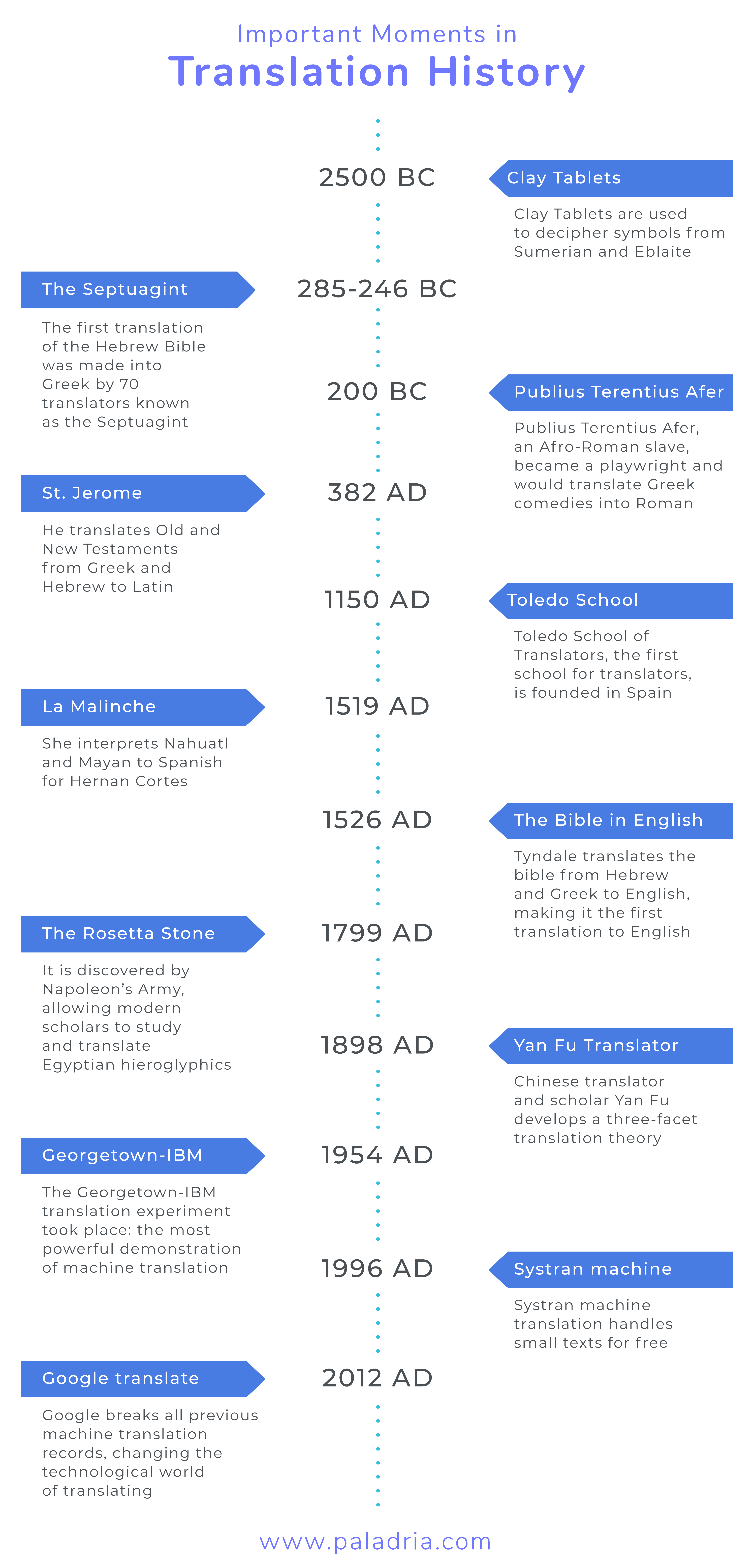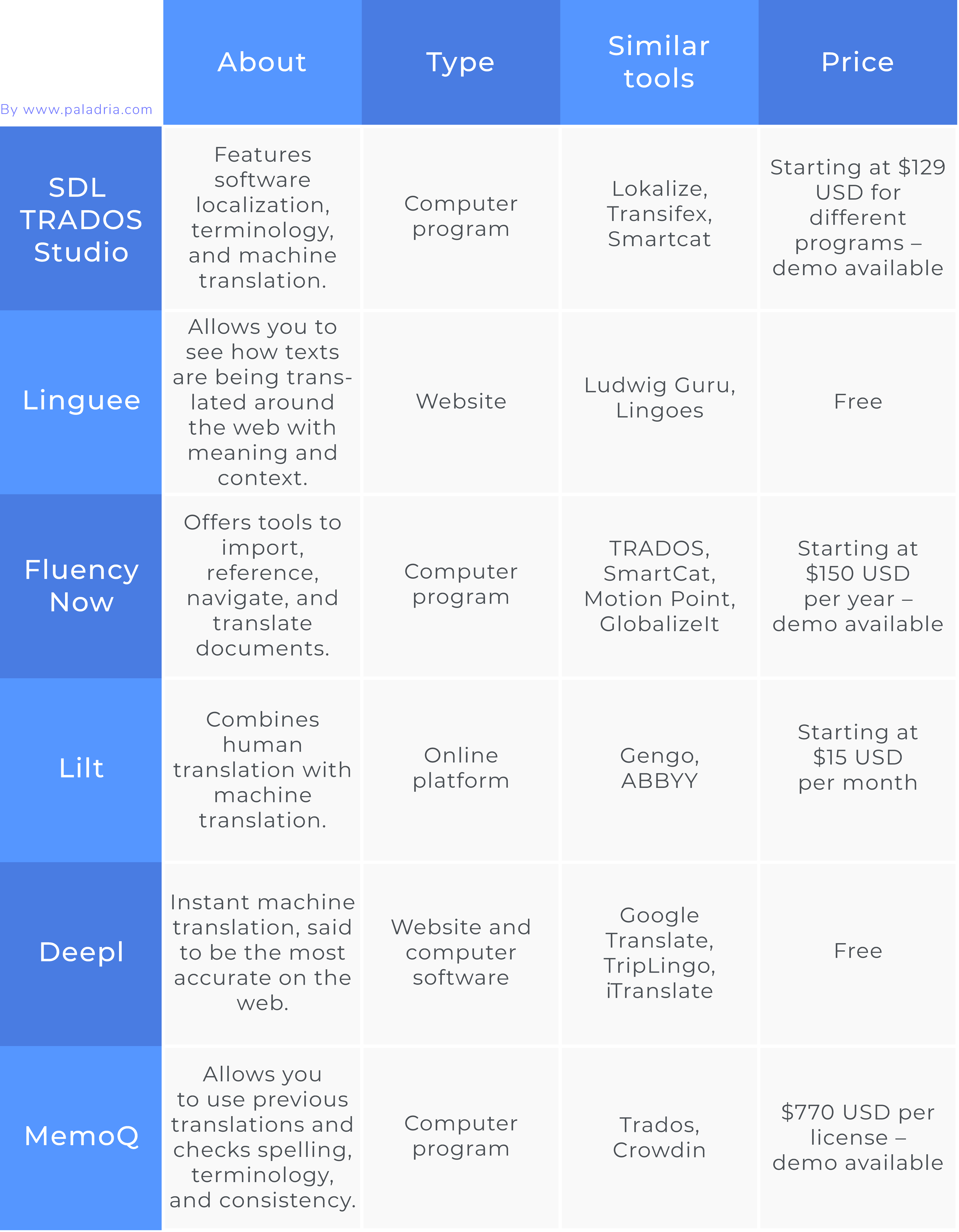The saying “there’s plenty of fish in the sea” might refer to romantic interests, but it’s just as true for translators. In 2020, whether we want to hire a translator or be one, the field of competition is vast and chock-full of players. How to choose the right one, or how to set ourselves apart from the sea of translators?
In this article we will look at how translation has changed over time, the relevance of studies, what is included in the concept of “professionalism” as it pertains to translator, and as well as other components that determine what makes a good translator. These topics will be broken down into subcategories and explained.
Then and Now: How Has Translation Changed?
Translators have come a long way from the revered role they used to play in society. The work began to make the bible accessible to a wider audience, and it shows as to this day the Bible is the most translated text in the world. Due to how rare it was for people to even know how to read or write, translators were even more difficult to come by. This made it so that if someone wanted a text to be translated, they would have to go to very specific people, there would be pretty much no competition in the field, and translators were wined and dined in respect for their work. Nowadays, the field of translation is overspread with not only people who can translate, but machines as well.

One of the things that help a translator in the 21st century, are the tools available to make a translator’s job easier. While machine translation will not do a serious project any true justice, it can still be used to do the job quicker. A human translator cannot be replaced however, due to the need to understand cultural context, pop culture references, tongue in cheek humor, and other nuances and sensitivities not understood by machines. Can a human do as good of a job without the machine? Absolutely. However, in regards to dealing with various projects or having to be time efficient, knowing to work with computer tools is something that benefits both translator and client.
Tools Available to Translators
The argument has been made time and again that machine translating cannot replace a human translator. We need humans to comprehend nuance. A machine does not understand things such as humor, sarcasm, or metaphor. A machine ignores traditional and pop cultural references. A machine also cannot consider the audience the project might be meant for and might also not know modern slang or other terminology that has recently been added to our everyday lexicon.
That being said, there are many tools nowadays that make a translator’s job easier and more time efficient. A translator in 2020 that knows how to use these tools to her advantage will undoubtedly have an edge over the competition as well as options to match each job to whatever tool is best suited.
The graph below shows some of the more popular Computer-Assisted Tools (CAT).

Not a comprehensive list, there are many other tools out there, the list is for educational purposes only. Prices are subject to change.
Just like incorporated spell check has done wonders for grammar, CATs and other translation tools (such as a thesaurus or any number of softwares) can help a translator take a more creative approach to each job. One could argue that the most optimal translation would be done with a combination of human and machine translation. Using these tools, however, comes with its own set of precautionary measures. Using online translation tools such as Google translate or Translate.com can result in breach of privacy. The text put into Google Translate does not disappear, and as such there is a lot of sensitive information that is accessible to anyone who knows how to get their hands on it.
Consider the private e-mails, tax reports, termination letters, or various other documents and texts that should not be seen by anyone else than the intended audience. All this information stays stored in the cloud, which the translator should know and as a result should not use these platforms for sensitive information.
The Competition in the Translating World
Back in the day translators were few and rare and revered in what they did. Nowadays with the spread of culture and opening of more translating schools, there are hundreds of translators to choose from. Some of them can be quite expensive while others seem to be incredibly cheap. As a translator, we may be tempted to either raise the price based on our worth and talent or lower it far too much to reflect our worth due to so many cheap (or free) alternatives. In translation, what you pay is what you get.
One of the things that we must consider is the fact that when a client pays for a translation to be done, they are not just paying a translator to convert words from one word to the next, they are also paying them to be a good writer, a thorough researcher, a cultural expert, and a basic editor. And, if the client knows what to look for, they are also paying for a team to meticulously take care of each project. Ergo, the price should include the translator, at least one expert editor, a project manager, and perhaps an audio or video editor as well, depending on each project. Competition can be fierce and getting a quote for projects is necessary. Rather than going for what is cheaper, we should go for what is more thorough.
The person that speaks to the client should make sure the clients feels understood, heard, and they should ask the right questions to understand the target audience and what the client is hoping for, and then correctly assign the project to a fitting translator and project team.
Certified vs Experienced: Do Studies Matter?
Some people will take a third language that they speak well, or will spend a year or two in Ecuador, then take their knowledge of this language and say they are professional translators. Each person’s ability to understand a language should be heavily scrutinized, as it is not enough for them to know how to say something in just one way but many ways. Being a good writer in a target language requires a mastering of the language that cannot be claimed from simply having spoken it for a long time. A good translator knows to use a thesaurus and understand context and how to code-switch within one single language. Consider the level of English you would speak in a formal meeting, versus the English you would use to speak to toddler or a teenager.
It is all different depending on the audience. Transferring one language to the next must be done by someone who understands that delicate line and respects the limits of language. Because there are so many language schools, one cannot be sure of their own expectations of what makes a good translator, and therefore, a certification does not always guarantee the best translator for the job. Many times, experience and knowledge will overtake the need for a certificate. When translating official government documents, however, does require officially certified translators.
This is not to say that education should be disregarded. Surely, someone that has undergone studies to be a translator that has studied linguistics, phonetics, and other related topics, will have knowledge to help them be a better translator. Yet this information is not limited to school, and experience can sometimes surpass studies. Consequently, if a translator has gone to school for translation, it may give them an edge, but not one that will necessarily outperform experience.
Professionalism and Skills
So, what does a professional translator look like?
1. Flexibility
A translator must be able to adapt. Not every project deserves the same approach, and a translator needs to be able to look at each project and the author or client of the work to meet the expected needs. Sometimes, a translation needs to be done immediately and a professional translator should have the tools to get the job done quickly and still have it be edited with meticulous care.
2. Organized
Sometimes projects are quite large, and they need to be divided into various parts. A skillful translator has a system down that will allow them to manage various files and parts of the project while sending it to be edited, to then review the edits and fix them accordingly. It is much like juggling knives, and if one is dropped, something gets cut out.
3. Punctual
Experienced translators have enough practice to know how long it takes them to do a job and will communication with their team so that they are turning things in on time. This is especially necessary if the turnover needs to be quickly after the project was assigned. If the job is time-sensitive, then it must be handed in to a translator that takes this into consideration and can work well under pressure to turn the assignment in on time.
4. Culturally Aware
We have gone over the importance of a translator having a metaphorical toolbox under their metaphorical belt, where they can pick out the right machine translation, app, or software to help them with their project. On the other hand, the translator must be an expert at catching cues that the machine could never. This means the translator must be sensitive and aware of cultural context that might need to be translated, as well as informed on the time periods discussed. In other words, the translator must keep up with the times and have a minimum of cultural knowledge.
5. Thorough researcher
Whatever the translator does not know, she must know how to appropriately research. They must know what websites to trust, and how to gather information that accurately depicts what the original language is saying to the target language.
6. Meticulous Editor
A competent company will assign a team to each project that includes at least one professional editor to look over the work of the translator. Nonetheless, a job well done is when the editor must make the least amount of changes. Most of the time, the editor is looking only a the translator’s work and not at the text of origin, and therefore the translator himself needs to re-read his work and make sure he did not miss any points, mistranslate, or mistyped something crucial that the professional editor might not catch due to it being a translation mistake.
7. Language understanding
A translator must absolutely understand the target language and all its subtleties to make a translation sound natural. That being said, their understanding of the original language can be that of someone that learned it as a second or third language. This is due to it working to their advantage that they hear the language the way a foreigner would, to know how to convey the message into their native language. Not to mention, how often have you heard someone say, “I understand better than I can speak”? That is because most of the time, our capacity to remember something we understand is activated when we see something. Whereas trying to remember how to say something in a language we do not dominate is much more difficult and time consuming.
8. A good reader and writer
When translating entire books or manuals, the translator must be an efficient reader and creative writer. It is not enough to skim through the text, one must truly grasp it and understand its foundation and message. When possible, the translator should read whatever they are translating before even beginning to translate. Of course, this is not always possible due to time constraints, as it would be difficult to read an entire book before translating it. This is when asking the client questions about the project is needed and doing a bit of researching about the topic is necessary. Once the reading is done, a translator knows to not impose their own voice in the writing, striving to maintain the original author’s voice as much as possible, while still making the translation sound like it was originally written in the target language.

That is to say, a good translation is one where you cannot tell that it is a translation. Therefore, the translator must be a good writer to make it sound as natural as possible.
While we may think that being particularly good at a language or having studied how to be a translator, it actually goes beyond that and requires much more. A good translator has experience and knowledge on what tools to use. They are up-to-speed on the technology that is used and know how to appropriately research topics in both languages. They must be a native speaker of the language or at the very least have grown up in the culture and be a native-like speaker of the target language.
A good translation company is one that takes pride in its translators and their capacity to grasp language, and not one that is in it for the money. Take the time to investigate and reach out to a translation company where you can talk to the people that will be delegating your project. You want to talk to a human, and not a bot or someone meant to simply “handle” you. Do not be afraid to ask questions about the level of knowledge and experience. Communication is key, as it is a translator’s literal job, and the company the translator works for should reflect this.
Have a project in mind? E-mail us so we can start a conversation about what your needs are.

Master Language Learning with Mosalingua
With Mosalingua's platform, you can immerse yourself in Spanish, French, Japanese, and more. Learn independently, while also benefiting from a committed team's support, ensuring continuous motivation and expert guidance every step of the way. With an impressive 4.5/5 ★ rating on the app and endorsements from Cosmopolitan, HuffPost, and Mashable, join the thriving community of language learners who rely on Mosalingua as their comprehensive solution for fast and effective language acquisition.
This website may contain affiliate links, which means we may earn a commission if you click on or make a purchase through the link.



